Minoxidil and Erectile Dysfunction: What You Need to Know
Written by Dr. Sharon Kumar

With a strong academic background in dentistry and clinical exposure, Dr. Sharon who has studied at PDM Dental College, brings a valuable blend of medical knowledge and communication skills to health content writing. She is passionate about creating clear, compassionate, and evidence-based content on topics such as general wellness, sexual health, oral care, and patient education. Her goal is to make complex medical information easy to understand, relatable, and genuinely helpful for readers seeking clarity on their health concerns. Dr. Sharon believes in the power of well-researched, empathetic content to educate and empower people to make better health decisions. Whether it’s writing about preventive care or breaking down myths in sexual wellness, her content always balances science with sensitivity.
•
August 8, 2025
Our experts continually monitor the health and wellness space, and we update our articles when new information becomes available.
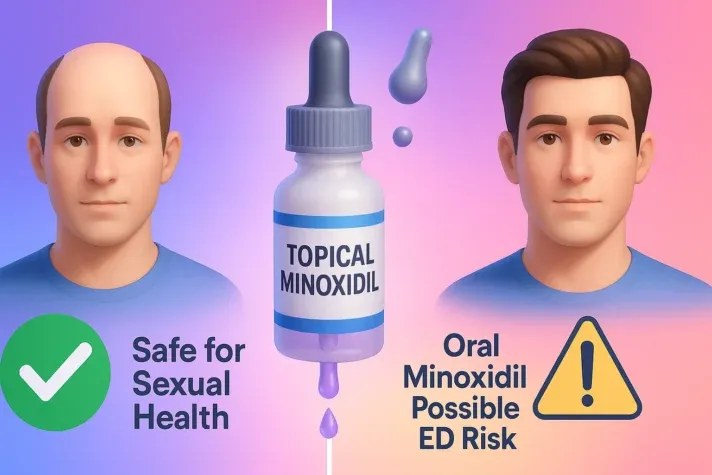
Quick Read
No, topical minoxidil is very unlikely to cause erectile dysfunction. Applied to the scalp, it has minimal absorption into the bloodstream, so it doesn’t affect sexual function. Research shows no proven link between topical minoxidil and ED. Confusion arises because oral minoxidil, taken as pills, works throughout the body and, in rare cases, may cause side effects like low blood pressure or erectile dysfunction. If you’re concerned about minoxidil erectile dysfunction, remember: topical = low risk, oral = higher risk. For most people, topical minoxidil is safe for hair loss and won’t impact sexual performance.
If you're wondering, does topical minoxidil cause erectile dysfunction? You're not alone. It's a common concern for men thinking about using minoxidil to treat hair loss. Hair loss has become quite a normal issue these days. Studies show hair loss is extremely common, affecting up to 85% of men and 33% of women during their lifetimes.[1] While the idea of sexual side effects can be worrying, topical minoxidil is usually safe and doesn’t directly affect sexual health. Unlike the oral version, which can sometimes lead to problems like erectile dysfunction, minoxidil erectile dysfunction isn’t a known issue with the topical form. In this article, we'll clear up whether minoxidil can cause erectile dysfunction, explain how the treatment works, and discuss the difference between topical and oral minoxidil. By the end, you'll have a better idea of whether this treatment is the right choice for you.
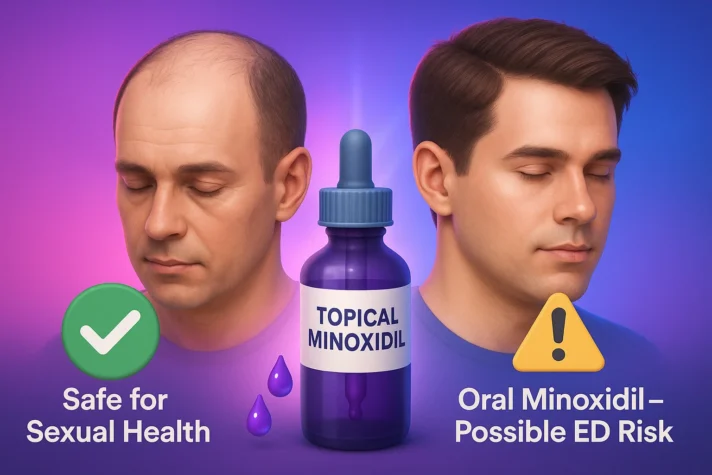
What Is Minoxidil Hair Loss Treatment?
Minoxidil is a popular hair loss treatment. It helps widen blood vessels to improve blood flow. When you apply topical minoxidil to your scalp, it boosts blood circulation to hair follicles. This stimulates hair growth and hair regrowth.
The topical solution works by:
- Minoxidil [2] works by dilating or widening blood vessels in the scalp, thereby enhancing blood circulation to the hair follicles.
- This increased blood flow provides essential nutrients and oxygen, stimulating the activity of dormant or inactive hair follicles.
- By activating inactive follicular cells, it encourages them to enter the growth phase of the hair cycle.
- As a result, the treatment helps to revitalize and nourish the hair follicles, ultimately promoting the growth of new, healthier hair.
- Research shows minoxidil activates hair follicles, stimulating a longer growth phase and new regrowth [3]
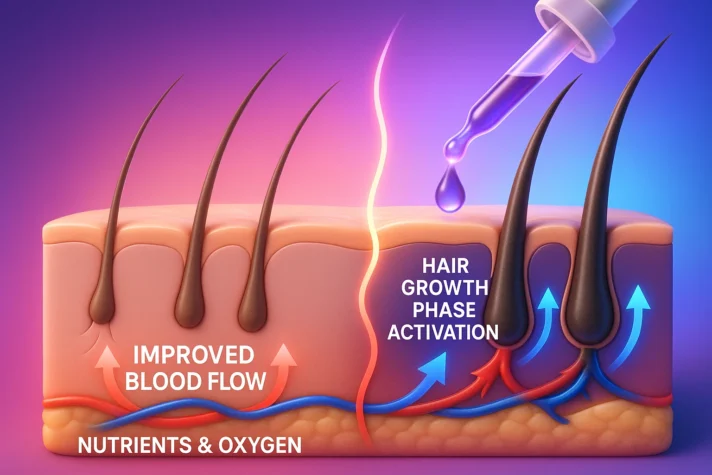
Common Uses of Minoxidil Hair Loss Treatment
The FDA has approved topical minoxidil for treating androgenetic alopecia (pattern hair loss) in both men and women.[4] Doctors prescribe topical minoxidil for certain conditions.
- Male pattern baldness (androgenetic alopecia)
- Female hair thinning
- Various types of hair loss
The topical treatment comes in 2% and 5% strengths. You massage it into your scalp twice daily.[5]
Does Minoxidil Cause Erectile Dysfunction?
Topical minoxidil is unlikely to cause sexual dysfunction or erectile dysfunction. Many clinical trial studies show that topical minoxidil does not cause erectile dysfunction directly. The topical minoxidil solution is applied directly to your scalp. Very little enters your bloodstream, and this barely affects the internal processes in the body.[6]
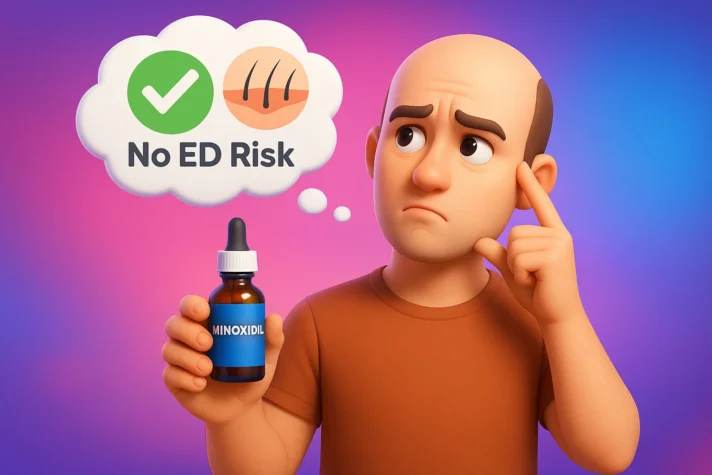
Why the Minoxidil Erectile Dysfunction Myth Exists
The myth started because:
Oral minoxidil (pills) may affect sexual health
Oral minoxidil, which is taken by mouth for blood pressure control, works throughout the whole body. In rare cases, it may cause side effects like fluid retention, blood pressure changes, or hormonal imbalances that could indirectly impact sexual function. This led some people to assume the same risk applies to the topical version, but that’s not the case.[7]
“If you’ve read about minoxidil and ED online, remember, those cases usually involve oral pills, not the topical solution most people use for hair loss.”
Online forums spread unproven claims
In hair loss and health forums, personal stories or fears about ED sometimes get repeated without scientific evidence. Over time, these opinions can start to feel like facts, even if they have no research backing.
Confusion between topical and oral treatment
Many people don’t realize that topical minoxidil is applied only to the scalp and absorbed in very small amounts into the bloodstream. This minimal absorption means it doesn’t work like oral minoxidil, and it’s far less likely to cause body-wide side effects, including erectile dysfunction.
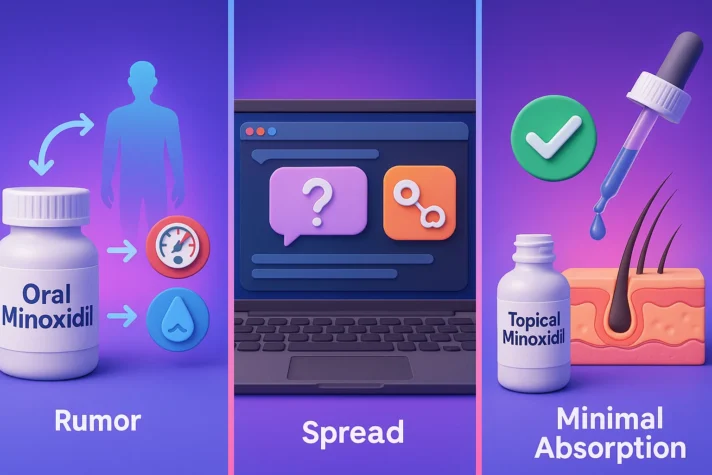
What Research Shows about Minoxidil Erectile Dysfunction
- Scientific studies have consistently shown that there is no connection between using topical minoxidil (the kind you apply to your scalp) and sexual side effects.
- This is because when you apply minoxidil to your skin, only a very small amount of the drug enters your bloodstream.
- The amount that gets into your blood is so low that it’s not strong enough to have any impact on things like sexual function or performance.
- The minoxidil you put on your scalp doesn’t spread through your body in a way that could affect your sex life. That’s why, even though some people worry about it, the research shows that you don’t need to be concerned about minoxidil causing erectile dysfunction or other sexual problems. [8]
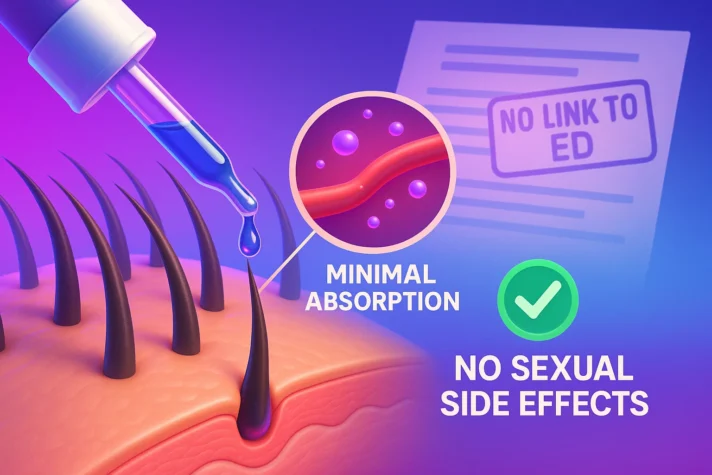
Topical vs Oral Minoxidil
Understanding the difference is crucial for your sexual health. [9]
Feature
Topical Minoxidil
Oral Minoxidil
Application
Applied to the scalp
Taken as pills or tablets
Absorption into Blood
Very minimal absorption
Fully absorbed
Localized Effect
Stays in the area where it's applied
Affects the whole body (because taken orally)
Risk of Sexual Dysfunction
Very low risk (because it doesn't enter the body)
Higher risk (because it enters the body)
Primary Function
Stimulates hair growth
Treats high blood pressure and hair loss
Effect on Blood Pressure
Generally has no significant impact on blood pressure
Can lower blood pressure, leading to side effects like dizziness, fainting, or erectile dysfunction
Common Side Effects
Scalp irritation, dryness, flaking, and unwanted hair growth in areas outside the scalp
Dizziness, fluid retention, low blood pressure, potential for erectile dysfunction
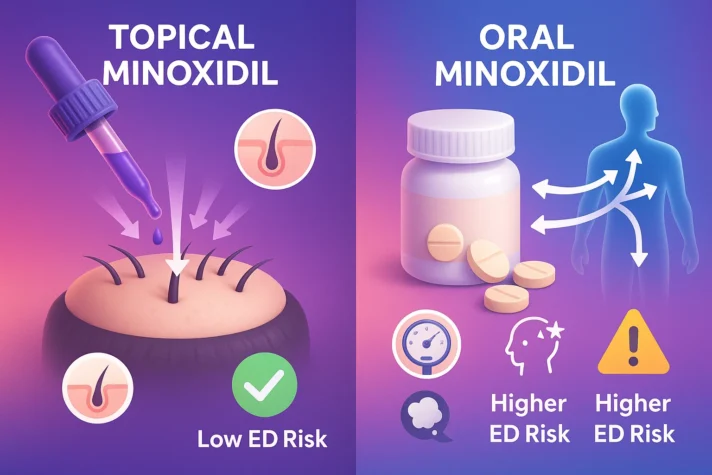
Real Side Effects of Topical Minoxidil
Topical minoxidil can cause:
Common Side Effects of Topical Minoxidil:
- Scalp Irritation: Redness or a mild burning sensation on the scalp.
- Itchy Scalp: Itching due to dryness or sensitivity.
- Dry Skin: Dryness and flakiness on the scalp.
- Temporary Hair Shedding ("Dread Shed"): Increased hair shedding as new hair grows.
- Scalp Sensitivity: Increased sensitivity to touch or pressure on the scalp.
Rare Side Effects of Topical Minoxidil:
- Allergic Reactions: Redness, swelling, or rashes, particularly on the face or neck.
- Unwanted Hair Growth: Hair growth on areas like the forehead or hands.
- Rapid Heartbeat: A faster-than-normal heartbeat occurs if too much product is absorbed.
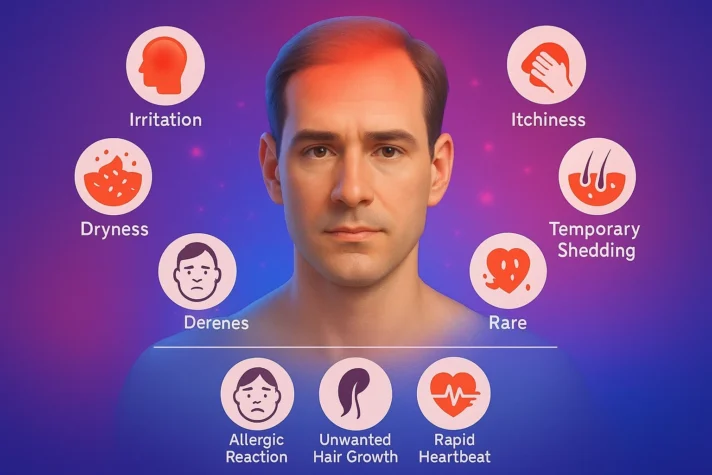
Other Hair Loss Treatments to Consider
If you're still worried about sexual side effects, other hair loss treatments include:
Alternative Options
-
Topical Finasteride
A medication applied to the scalp to reduce hair loss by inhibiting the hormone responsible for hair thinning, but it may cause sexual side effects in some users.[10]
-
Hair Transplant Procedures
A surgical method where hair follicles are moved from a thicker hair area to a thinning or balding area for a more permanent solution to hair loss.[11]
-
ARTAS® Hair Restoration Technology
A robotic system used for precise, minimally invasive hair transplants, which automates the extraction and implantation of hair follicles.[12]
-
Hair PRP Treatment
A procedure where platelet-rich plasma from your blood is injected into the scalp to stimulate hair growth and improve hair thickness.[13]
-
Low-Level Laser Therapy
A non-invasive treatment using red light to stimulate hair follicles, promoting hair growth and improving hair density.[14]
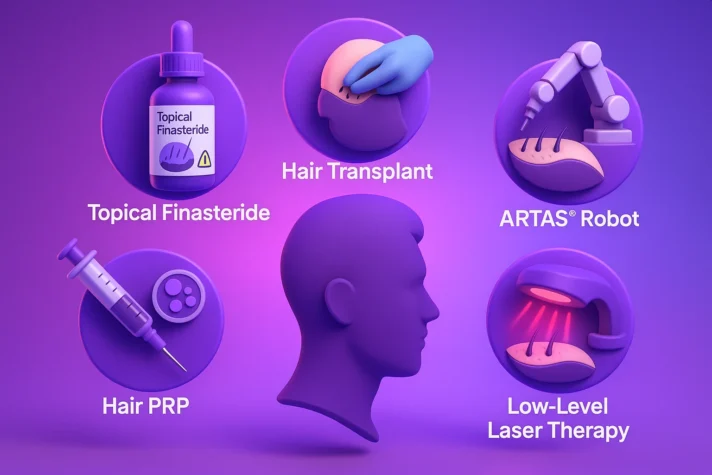
Combining Treatments for Hair Loss
Many doctors combine treatments for better results:
- Topical minoxidil + hair transplant
- Multiple topical therapies
- Medical treatments + Hair Transplant Procedures
When to See a Doctor while taking Minoxidil
You should consult a healthcare provider if you notice any of the following while using minoxidil:
Sexual dysfunction
If you're having trouble with things like sexual performance, it might be a side effect of the treatment.
Severe scalp irritation
If your scalp becomes extremely red, itchy, or inflamed.[15]
Chest pain or rapid heartbeat
If you experience chest discomfort or your heart beats faster than usual.[16]
Unwanted hair growth elsewhere
If hair begins growing in places you don't want, like your face. If you run into any of the above issues, it might help to see a dermatologist who also specializes in sexual medicine. They can:
- Understand your symptoms and what might be causing them.
- It's important to make sure other health problems aren't contributing to any sexual problems.
- Your doctor can suggest changes to your hair loss treatment to avoid unwanted side effects.
- They’ll keep track of how your body reacts and suggest tweaks if needed.
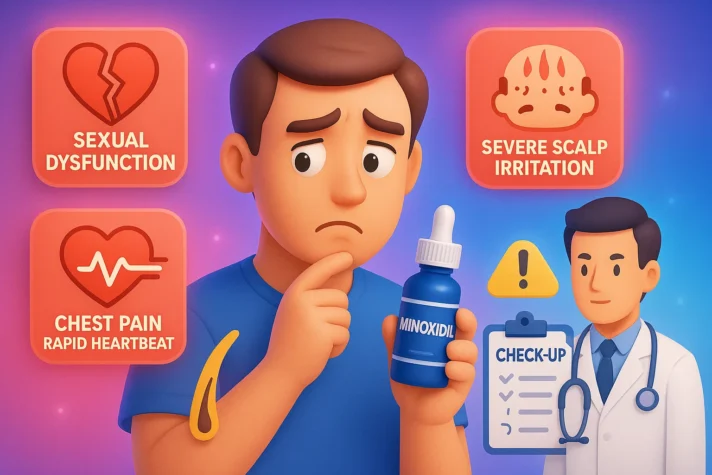
Making the Right Choice like Minoxidil
When deciding on hair loss treatments like topical minoxidil, consider these points:
- It’s proven to help with hair regrowth for many people.
- It's generally safe for most users, with minimal side effects.
- It doesn’t usually cause sexual side effects, unlike some other treatments.
- It can increase hair thickness and density of hair over constant use.
Conclusion: Minoxidil and Erectile Dysfunction
For most people, topical minoxidil is a safe and effective hair loss treatment with no proven link to erectile dysfunction. It's local action on the scalp and minimal absorption into the bloodstream means it’s highly unlikely to impact sexual function. The ED concerns often come from confusion with oral minoxidil, which works throughout the body and carries a higher chance of side effects. If you’re still unsure, talk to your doctor about your options, from topical treatments to non-drug alternatives. With the right approach, you can address hair loss confidently without putting your sexual health at risk.
Disclaimer
The following blog article provides general information and insights on various topics. However, it is important to note that the information presented is not intended as professional advice in any specific field or area. The content of this blog is for general educational and informational purposes only. The content should not be interpreted as endorsement, recommendation, or guarantee of any product, service, or information mentioned. Readers are solely responsible for the decisions and actions they take based on the information provided in this blog. It is essential to exercise individual judgment, critical thinking, and personal responsibility when applying or implementing any information or suggestions discussed in the blog.
Most Asked Questions
Does topical minoxidil cause erectile dysfunction?
No, topical minoxidil has limited systemic absorption and is not generally associated with erectile dysfunction.
Can minoxidil cause erectile dysfunction?
The oral form of minoxidil may contribute to erectile dysfunction due to its vasodilatory effects, but this is not common with the topical version.
What should I do if I experience erectile dysfunction while using minoxidil?
Consult your healthcare provider to determine whether minoxidil is the cause, and explore alternative treatments if necessary.
Can oral minoxidil lead to erectile dysfunction?
Yes, oral minoxidil may cause erectile dysfunction in some individuals due to its effect on blood circulation and blood pressure.
How can I avoid sexual side effects with minoxidil?
Use topical minoxidil as directed, avoid excessive doses, choose reputable brands, and monitor for side effects. If problems occur, consult your doctor promptly.
Sources
- 1.
Hair Loss: Causes, Types, and Other Facts
- 2.
Minoxidil
- 3.
Minoxidil versus nitroglycerin: a prospective double-blind controlled trial in transcutaneous erection facilitation for organic impotence
- 4.
A randomized clinical trial of 5% topical minoxidil versus 2% topical minoxidil and placebo in the treatment of androgenetic alopecia in men
- 5.
Drug Approval Package Print Share E-mail
- 6.
Minoxidil: a comprehensive review
- 7.
Efficacy and safety of oral minoxidil in the treatment of alopecia: a single-arm rate meta-analysis and systematic review
- 8.
Safety of low-dose oral minoxidil for hair loss: A multicenter study of 1404 patients
- 9.
Oral Minoxidil vs Topical Minoxidil for Male Androgenetic Alopecia
- 10.
Efficacy and safety of topical finasteride spray solution for male androgenetic alopecia: a phase III, randomized, controlled clinical trial
- 11.
Home Hair and nails Hair transplant surgery Actions for this page Listen Print Summary
- 12.
What to Expect With ARTAS Robotic Hair Transplant?
- 13.
PRP for Hair Loss: Procedure, Benefits & Costs
- 14.
Low-level laser (light) therapy (LLLT) in skin: stimulating, healing, restoring
- 15.
Dandruff and itching scalp
- 16.
Chest Pain


